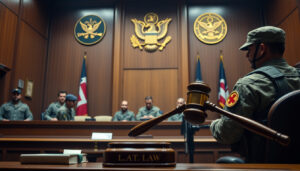In the intricate world of military law, one area that often causes concern among servicemembers and their families is Non-Judicial Punishment (NJP). Imagine being a soldier, sailor, airman, or marine with years of dedicated service, suddenly finding yourself facing allegations that could tarnish your record and career. It’s a scenario too many servicemembers have faced, and it raises a pressing question: What should you know to effectively navigate NJP and protect your military career?
As you delve deeper into this guide, we will unpack the complexities surrounding NJP, provide practical strategies to safeguard your rights and reputation, and dispel some common myths along the way.
Understanding Non-Judicial Punishment (NJP)
Non-Judicial Punishment, often referred to as Article 15, is a disciplinary action that commanding officers can impose as an alternative to judicial proceedings (i.e., court-martials). The purpose of NJP is to handle minor offenses in an efficient manner while still maintaining good order and discipline within the ranks.
Key Points about NJP:
- Authority: Commanding officers have the authority to impose NJP on servicemembers under their command.
- Types of Punishments: The penalties for NJP can range from extra duties and restrictions to reductions in rank and forfeiture of pay.
- Rights of the Accused: Servicemembers have the right to refuse NJP and demand a court-martial if they believe the allegations against them warrant such proceedings.
Common Reasons for NJP
- Minor Offenses: NJP is generally reserved for less severe misconduct, such as:
- Failure to obey a lawful order.
- Article 134 offenses, such as misconduct or conduct unbecoming of a servicemember.
- Drunk and disorderly conduct.
- Administrative Errors: Sometimes mistakes or technical violations can also lead to the imposition of NJP.
- Failure to Meet Standards: NJP can result from a failure to maintain military standards in areas like appearance, physical fitness, or military conduct.
What to Do if You are Facing NJP
Finding yourself on the receiving end of NJP can be overwhelming, but it’s essential to understand what steps to take to protect your career and reputation.
Actionable Steps:
- Consult with a Military Defense Lawyer: Engaging with experienced military attorneys can provide you invaluable insights and guidance on handling your case. A civilian defense lawyer with specific knowledge of military law can advocate for your side effectively.
- Understand the Allegations: Make sure you thoroughly comprehend the specific charges against you. Ask for a detailed explanation of the allegations and any supporting evidence.
- Gather Evidence: Collect any pertinent documentation or witnesses that may help dispute the allegations or mitigate the punishment.
- Consider Your Options: As mentioned, you have the right to decline NJP and request a trial by court-martial. If you believe the charges against you could lead to significant consequences, carefully weigh this option.
- Prepare for the NJP Hearing: If you choose to proceed with NJP, gather your thoughts on why the evidence does not support the charges. Structure a clear and logical defense.
Common Misconceptions about NJP
It’s essential to debunk some common myths about NJP to make informed decisions:
Myth 1: NJP is equivalent to a court-martial.
Wrong. NJP is designed for less serious offenses and is separate from court-martial proceedings, which handle more significant violations.
Myth 2: You cannot appeal an NJP decision.
This is untrue. While the ability to appeal may depend on the service branch’s regulations, servicemembers can request a review of the punishment.
Myth 3: Accepting NJP is always better than going to a court-martial.
While NJP is generally less severe, it can still impact your service record and future career opportunities.
Seeking Help from Military Defense Lawyers
When facing NJP, having a knowledgeable attorney can make all the difference. Here’s what to look for when hiring civilian military defense lawyers:
- Experience with NJP and Military Law: Ensure they have a strong background in military legal matters, particularly with NJP cases and Article 15s.
- Reputation: Look for reviews, testimonials, and track records that indicate success in defending servicemembers.
- Accessibility: The attorney should be available for consultations and updates during the proceedings.
- Clear Communication: They should simplify the legal jargon and communicate effectively with you and your command.
The Role of Experienced Court Martial Attorneys
Experienced court martial attorneys can significantly alleviate the burdens of dealing with NJP. They are adept at preparing you for hearings, negotiating with commanding officers, and ensuring you receive a fair and objective assessment of your case. A solid defense could mean the difference between retaining your military career or facing serious repercussions.
Conclusion
Navigating the waters of Non-Judicial Punishment can be challenging. However, by arming yourself with knowledge and consulting experienced military defense lawyers, you can effectively protect your rights and your reputation. Remember, you are not alone—many servicemembers have successfully tackled NJP with the right resources.
If you or a loved one are facing legal issues in the military, contact Gonzalez & Waddington, Civilian Military Defense Lawyers, at 1-800-921-8607 for a free consultation. Our experienced team represents servicemembers worldwide.
Further Resources
By familiarizing yourself with NJP, you can take proactive steps to defend your military career and ensure your rights are protected throughout the process.


